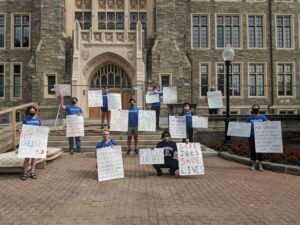During the last two weeks of September, student inboxes filled up with subject lines reading “Public Health Alert: Student Illnesses” and “Update on Gastrointestinal Illness on the Main Campus.” Not all the emails were so stress-inducing (“#1 Men’s Soccer Returns to Shaw Field”), but others were more so (“GU Care Navigator Notification” or “Message from Medical at One Medical”). Then, on Sept. 30, an email from the Office of the Provost: “Important Information On Your Classes.”
The email stated that students must go to class unless they are experiencing COVID-19 symptoms or test positive, and that teachers are not required to accommodate any other absences.
“You should not expect that you will be able to participate synchronously (i.e., Zoom) in a class designated as in-person, nor should you assume that you may miss class and make up the material asynchronously without an approved reason for doing so,” Vice Provost for Education Rohan Williamson wrote in the email.
It didn’t take long for students like Ace Frazier (MSB ’23) to take issue with this sweeping message, with indignation spreading across Twitter and GroupMe in a student body that saw more than 145 reported cases of another viral disease in the two weeks prior.
“It’s just like, if you’re sick, suck it up,” Frazier said in an interview with the Voice.
Last week, Frazier came down with a fever and a cough right before a midterm in one of their classes. Per the policy, their professor didn’t have to accommodate them with an alternate time, so they had to reach out to their dean for help.
“It felt so strenuous to try and get an extension of an alternate day,” said Frazier, “which seems so feasible.”
To Frazier, who stayed on campus last year, this approach felt like a far cry from the extreme caution of previous months, when there was seemingly no way the university would risk a spread by letting a sick student leave their house.
“I just don’t understand why all of a sudden, now, they have this lack of understanding around health procedures and health measures that can keep people safe,” Frazier said.
Jameson Nowlan (SFS ‘23) said she saw this change in priorities not just as a shift away from last year’s caution, but also to some extent from the university’s values.
“At Georgetown, we are preaching these Jesuit values, we’re preaching men and women for others, care for the whole person, and those are values that I deeply believe in. Those are values that Georgetown very much used throughout the pandemic as inspiration and as a source for the reasons we need to stay at home,” Nowlan said. “So it was really shocking to me that now, as people are getting sick and we have that same care for others, they’re completely setting that aside and saying you need to attend in-person class if you don’t have COVID.”
Last week, with so many diseases going around, Nowlan said she felt like she was playing a game of Russian roulette in terms of which she’d contract. She “dodged a bullet” with a common cold, but the past year and a half has conditioned her to still be extra wary.
“Back in high school, before this pandemic happened, when I would get sick, I would muscle through it. I would show up, probably get everyone else sick, but we only had colds and things like that to worry about, so oh well,” Nowlan said. “Now, when I get sick, it’s like, ‘Oh God, do I have COVID? Am I going to kill somebody?’ Which is such a larger burden.”
Dominic DeRamo (COL ’23), a member of GUSA’s Accessibility Policy Team, said that in writing the Sept. 30 email, administrators demonstrated a failure to understand this larger ethical burden students may be dealing with when sick, even without a positive COVID-19 test.
“It is a very long communication line between students and the very top level administrators that are making these decisions, and I think that’s where so much of my frustration around the Provost’s email comes from,” DeRamo said. “I think it is getting at that fundamental problem that upper-level administrators don’t understand student perspectives right now. I think that they’re willing to listen, and they are responsive, but right now there is a communication error.”
A memo obtained by the Voice from the beginning of the semester also suggests that administrators are encouraging professors to adhere to policies from pre-pandemic times. The memo, sent by the Dean’s Office of the College to department heads for distribution to faculty, is titled: “Students have been asking if they can take class remotely for a variety of reasons. Can I let them?” It lists some questions teachers should ask themselves before granting a non-COVID-related, short-term exception to the in-person rule. The first question is: “Would I have said yes to this in Fall 2019?”
This falls under a larger pattern that some students have observed about misunderstanding the intent, mindset, and priorities of students in seeking remote options.
“Maybe it doesn’t benefit the in-person learning environment if there are a bunch of kids who take it online, but maybe it benefits our lungs and our hearts and our bodies,” Nowlan said. “I think there are much more important things sometimes than attending my Russian class in person. So that’s what frustrated me so deeply about the email is how distant it felt from the reality of student life.”
The extent of this misunderstanding worried students like Megan Skinner (SFS ‘24), GUSA’s Crisis Response Director.
“Many people including myself saw it as an issue of safety,” Skinner said in an interview with the Voice. “The point of the email really seemed like, ‘COVID numbers are down, so we’re going back to pre-pandemic policies.’ And this just frankly seemed unacceptable, because we are still actively in a pandemic, and forcing everyone to go to class just seems illogical.”
Skinner and the GUSA executive branch replied to the Provost with their own email, which detailed student concerns, from the recent norovirus outbreak to the unavailability of technology to facilitate hybrid learning. They sent the email to five points of contact in the administration and asked for a meeting to discuss the policy immediately. They had not heard back from anyone in the administration as of Oct. 4, Skinner said.
The Office of the Provost has not followed up on the email as of the time of publication. In an email to the Voice, the university reiterated that class attendance remains a high priority this semester.
“While a small number of classes have been designated as online or hybrid, Georgetown remains committed to in-person engagement this semester and asks that all students attend class in person,” a university spokesperson wrote. “We recognize that the return to the classroom has been an adjustment for everyone; we will continue to work to make students’ experiences in class as rich as ever.”
Provost Robert Groves has announced an Undergraduate Student Public Health Forum to listen to questions and concerns from students. The forum is set for Oct. 13 from 11:30 a.m. to 12:30 p.m., which will be accessible online here.
According to DeRamo, the willingness to listen is a good start.
“Don’t get me wrong, I significantly appreciate them holding the forum, and I appreciate them making this kind of communication available to us,” DeRamo said. “But at the same time, it does not undo the damage that was done by their September 30th email. That email actively made students feel unsafe and ignored.”
Some students with disabilities, in particular, felt alienated by the message in the email. Health on campus is not something to weigh against academics for many, which is how DeRamo felt the email framed it.
“I will confidently say this as someone who’s immunocompromised: I have been unbelievably anxious over the return to campus. And now that someone in my class has tested positive, everyone in my class is potentially exposed, and I’m still being told that I have to attend class just because I’m vaccinated,” DeRamo said. “So I think that from the perspective of disabled students, this email was incredibly insensitive to the very vulnerable situations that some students are in right now. And as a result, it’s making us feel isolated, unheard, and terrified.”
Frazier said that because those with disabilities already tend to be hit harder by infectious diseases like the flu, the attendance policy ends up being more impactful for them.
“It just shows a lack of respect and care and support for these communities who are dealing with struggles beyond that of the average person,” Frazier said.
Ultimately, the decision to accommodate is up to professors—if a professor decides to be more lenient with attendance than the Provost’s guidelines, they may do so. But Skinner said that she and GUSA hope that the university adopts changes to make classes across the board more accommodating.
“We’re hoping that they can standardize the [attendance] policy,” Skinner said. “It just doesn’t seem right that some professors can offer to help their students and others will just leave them in the dust, which has been the case at some points this year. The administration needs to be willing to work with professors on that as well. If there’s a mandate in place for us, maybe the professors need to have more clear guidance as well.”
A more uniform, accommodating policy guided by administrators, DeRamo said, would go a long way to show students that the university is listening to their experiences and perspectives.
“I think that the university should encourage professors to be more flexible,” said DeRamo, “and explicitly encourage all of us to be understanding of the fact that we are all still going through something that is incredibly traumatic right now.”
Updated to include a comment from a university spokesperson.







